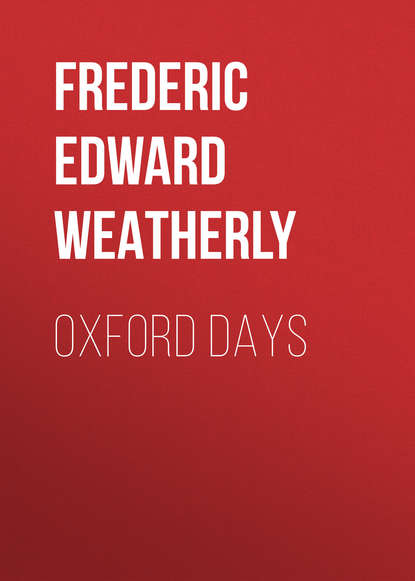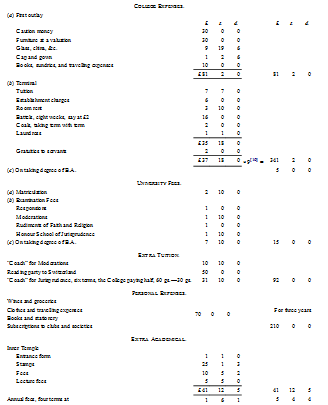 Полная версия
Полная версияOxford Days
It may be convenient here to enumerate roughly Frank’s expenses during his three years’ academical career. It will be remembered that his life has been that of an ordinary undergraduate. Its cost is therefore considerably in excess of that of a great many. It is also considerably below the level of comfort and luxury which in some cases folly induces, and in others is justified by adequate means. He came to Oxford not for intellectual advantages only, nor for social advantages only, but for both. He wished to be neither a spendthrift nor a “smug,” and he has been neither.

Three years contain twelve legal terms, but only nine of payment, the Easter and Act terms being virtually one in matter of residence.
On Thursday morning, having paid to the Dean the necessary College fee, and from him obtained a certificate of twelve terms’ residence, Frank, duly attired in cap and gown, white tie, and the statutable garments “of a subfusc hue,” proceeded to the Apodyterium of the Convocation House. There he paid the University fee, and showed to the Registrar the testamurs gained in Moderations and the Rudiments of Faith and Religion, and a certificate of his having been placed in the second class in the Honour School of Jurisprudence.
These preliminaries over, he met his party and took them into the Convocation House. There, having waited for half an hour, in a crowd that made moving impossible, and speaking almost a difficulty, the impatient spectators were informed that Convocation was removed to the Sheldonian Theatre, a piece of information certainly welcome, but one which they thought might have been given them before.
Perhaps it need not be said that four hearts at least were filled to overflowing as Frank went up with several other Paul’s men to be presented by the Dean to the Vice-Chancellor, and at least one pair of bright eyes shone the brighter for the tears that would rise up in them. And then with what pride Frank slipped on his gown and tipped his scout, William, the customary sovereign, and what a happy party sat down to lunch in Paul’s! Crawford was there, the new Fellow of Queen’s, not yet grown donnish and distant; and little Blue-eyes too was there, who had made firm friends with Rose, with whom she talked with pride of their two lovers.
In the evening the young people went to Nuneham, Rose and Mary sitting in the stern, Blue-eyes in the bows, where she paddled in the water like a very child; Crawford and Frank rowing. Mary had brought her sketching-book, and when they had had tea in the Moss Cottage, and a stroll was proposed, nothing could induce her to accompany the others. She wanted to sketch the rustic bridge and the river, and plenty of time she found for the purpose. For surely never were folks so long as Rose and Frank, Blue-eyes and Crawford, in walking through the lovely Nuneham woods. Like the bright June leaves that hung over them, life was young, and fresh, and bright; sobered, not saddened, by the twilight of earnest thoughts of the work that lay before them. Oxford had done her best for these two sons of hers; had not soured them; had not robbed them of their early faith; had not taught them to posture as the disciples of creeds as meaningless as they are cold and dead; had not inflated them with the notion that Oxford thought leads England and therefore the world; had not elated them with their academical success; but was sending them forth full of energy and full of hope, with the belief that life, that stern hard battle, was beginning and not ending with the winning of a degree.
THE END1
The subjects at other colleges are much the same, but the standard of excellence required varies. No. 2 is usually omitted.
2
At most colleges a reduction is made for scholars and exhibitioners.
3
At some colleges quarterly.
4
The titles given to the different Heads of Colleges vary. There is the Warden of New College, the Provost of Oriel, the President of Trinity, the Master of Balliol, the Principal of Brasenose, and the Rector of Exeter.
5
College bills.
6
Responsions are obligatory on all except those who have passed either the Previous Examination at Cambridge, or the Oxford and Cambridge Schools’ Examination. There are five separate subjects of examination, in each of which a candidate must satisfy the Examiners (who, in this case, are called “Masters of the Schools”). The principle of compensation is not recognized; failure in any one subject rendering a candidate liable to a “pluck” (commonly called “plough”). Subjects:—(1) Algebra: Addition, Subtraction, Multiplication, Division, Greatest Common Measure, Least Common Multiple, Fractions, Extraction of Square Root, Simple Equations containing one or two unknown quantities, and problems producing such Equations; or Geometry—such an amount as shall be equivalent to that which is contained in Euclid I., II. (2) Arithmetic—the whole. (3) Latin and Greek Grammar. (4) Translation from English into Latin prose; it is sufficient if the Latin be grammatically written, without being elegant in style; three or four violations of the simple rules of Latin Syntax (commonly called “howlers”) will “plough” a candidate. (5) One Greek and one Latin Author; candidates are free to offer any standard classical authors, but the selection is usually made from the following list:—Homer: any five consecutive books; Æschylus: any two of the following plays—Agamemnon, Choephoræ, Eumenides, Prometheus Vinctus, Septem contra Thebas. Sophocles: any two plays. Euripides: any two of the following—Hecuba, Medea, Alcestis, Orestes, Phœnissæ, Hippolytus, Bacchæ. Aristophanes: any two of the following—Nubes, Ranæ, Acharnenses. Thucydides: any two consecutive books. Xenophon: Anabasis, any four consecutive hooks. Æschines: In Ctesiphontem. Virgil: (1) the Bucolics, with any three consecutive books of the Æneid; or (2) the Georgics; or (3) any five consecutive books of the Æneid. Horace: (1) any three books of the Odes, together with a book of the Satires, or of the Epistles, or the Ars Poetica; or (2) the Satires with the Ars Poetica; or (3) the Epistles with the Ars Poetica. Juvenal: the whole except Satires II., VI., IX. Livy: any two consecutive books, taken either from Books I.-V., or Books XXI.-XXV. Cæsar: De Bello Gallico, any four consecutive books. Sallust: Bellum Catilinarium, and Jugurthinum. Cicero: (1) the first three Philippics; or (2) De Senectute and De Amicitia; or (3) four Catiline orations, with the oration Pro Archia. The books most commonly chosen are Euripides,—Hecuba, and Alcestis; and one of the combinations in Virgil or Horace.
7
Moderations or First Public Examination will be explained in due course.
8
Turl Street. High Street is “the High;” Broad Street, “the Broad,” in Oxford vernacular.
9
The new Debating Hall, now (October) almost complete, will provide ample accommodation for visitors.
10
Now—O tempora! O mores!—defunct.
11
The customary fee for a term’s private tuition, consisting of three lessons weekly, of one hour each.
12
Steeplechases.
13
Affectionate abbreviation for Slapoffski, unrivalled in Oxford, and not unknown outside.
14
Senior Students at Christ-Church correspond to Fellows at other Colleges.
15
I.e. races for sculling-boats and pair-oars.



